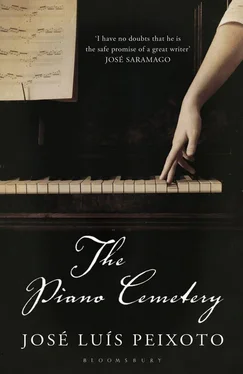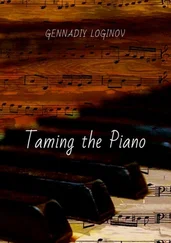My daughters’ mouths open. My wife and Simão lift their faces as though they have been struck, like martyrs. Ana and Elisa look around to try and understand what they should be feeling. Hermes and Íris, sitting on the floor, play with their fingers and don’t understand. They laugh quietly to one another.
Francisco gets up. He runs slowly, disoriented. My wife brings her hands together on her lap, as if she were praying. She is not. Maria makes as if to say something in an anxious voice. Marta tells her to be quiet. The distance passes very slowly now. The runner who is in first place is already very far away. Unreachable. My wife’s eyes are closed. Simão is examining the palms of his hands. My daughters’ gazes are lost on a non-existent horizon. Twenty-five kilometres — Francisco falls again.
He gets up again. Within the absolute silence of the kitchen the commentator’s voice is serious and tormented. Hermes and Íris begin to notice that something is happening that they don’t completely understand. On the streets of Lisbon there must be many things happening that no one could have imagined. On the streets that Francisco ran so many times, many things must be happening. The commentator wonders how much longer Francisco can hold out. He’s dragging his feet on the ground. Portugal. Thirty kilometres. Francisco falls, exhausted. His body, lying there, is surrounded by people. My daughters, Simão and my wife get up from their chairs and run to the wireless, as if they could get inside it.
I must go and meet my son.
After they had put Francisco on to a stretcher and taken him to the hospital, the commentator said something about death. He said definitely. Marta, trying to keep her voice calm, told Elisa to take her brother and her cousins to the living room. Simão hugged his mother, kept her safe in his arms. Shrunken, she cried and she was a being beneath a tempest, a tempest was passing through her. Her body was small in Simão’s arms, it had no will and no shape.
‘It’s probably nothing,’ said Maria, approaching, and deceiving herself.
But the commentator said something about death again. Exhaustion. Maria started a low whimpering, like a wounded animal. Marta, in her huge body, had the prominent eyes, the pursed lips of a little girl. And the commentator spoke in a sorrowful voice. There was no more Sunday. The marathon had finished.
My wife came out from Simão’s arms, lost. She wandered, disoriented, one way and another. Our children watched her and there was nothing they could do. The commentator said goodbye to his listeners. His listeners. It was Simão who turned the wireless off.
And nothing. The noise of the refrigerator existing — a vibrating silence. The sad details — the fruit bowl, the kitchen sink, the tiles and the fear, the panic of the window — the height of the window, three storeys, and everyone who had perished beyond it. Simão was crying as though coughing or choking. Marta and Maria cried freely, rivers after a fall of rain. My wife lost all her strength.
She sat down, not reacting. Within her, she had being certain and she had not wanting to believe it. She had definite and impossible. My wife, deciding nothing, remembered our son when he was still small, ten years old, and a dizziness of images tumbled inside her — blood. She remembered our son just born, and at that moment she was dead.
Then the afternoon. No one could understand its calm. Waiting. Each of them abandoned. Time passed, clouded up by the light and distorted by the faces, it went through them, and, clouded up, distorted, installed itself slowly within each of them. Time was a stagnant lake of grey water that slowly grew inside each of them. Simão was the only one who had the courage to approach the window and look at the world, as though it still existed. And it did exist — invisible, meaningless.
There was nothing they could do but wait. Nothing — a void, a vacuum, a single absence, no reply. They had stopped knowing how to wait, but bit by bit they were forced to relearn the unbearable task of waiting. They were forced. There is no need to ask questions of shadows. Hours passed.
At times, Maria or Marta, aware, got up from the chairs where they were getting old and went down the corridor to check that the children were all right. Only Elisa looked at them differently. Ana, Hermes and Íris all smiled, in a normal day. It was still Sunday, for them.
In the kitchen there was only the silence populated by memories, and all my children’s and my wife’s fears covering up a certainty, an abyss, that existed, voracious, between them, like a bonfire lighting up their faces. The night was beginning.
Death.
At nine o’clock at night the telephone rang. Nobody knew what to do. The ringing of the telephone tore through them, it was barbed wire dragged across their skin. My wife had her head in her hands, because she couldn’t bear it. Marta and Maria went back to being two little girls, sisters. Simão knew it had to be him to answer the telephone. As he walked, he realised that he had legs and arms and hands. He breathed. He held the telephone. Next to him, the chrome-plated frame — the photograph that we all took together in Rossio. He held the telephone. He answered. Time. The faces of my wife and my daughters forgotten in a fault of time. Simão’s voice:
‘Yes, yes. All right. I’ll tell them.’ He walked over to my wife, to my daughters, and told them. He stood there, as though looking at his own words and trying to understand them. An infinite, incandescent light. My wife and my daughters watched him, not knowing how to understand him. Francisco’s son had just been born.
Francisco’s son had just been born.
The words were:
‘He’s been born, Francisco’s little boy.’
Francisco’s son had just been born.
José Luís Peixoto was born in 1974 in Galveias, Portalegre, in Portugal’s Alentejo region. A journalist, novelist, poet, dramatist, literary critic and teacher of languages and contemporary literature, he is also a heavy-metal fan and produced a book and record called The Antidote with Gothic band Moonspell. His work is published and acclaimed in many languages and has won major prizes in Portugal and Brazil, including the José Saramago Prize in 2001 for Blank Gaze .
Daniel Hahn is a translator of fiction and non-fiction, mainly from Portuguese. His translation of The Book of Chameleons by Angolan novelist José Eduardo Agualusa won the Independent Foreign Fiction Prize in 2007.
Francisco Lázaro was a Portuguese athlete who died after completing thirty kilometres of the marathon at the Olympic Games in Stockholm, in 1912. The character in this novel who shares his name is based only circumstantially on his story, and all the episodes and characters depicted come from the realm of fiction.












